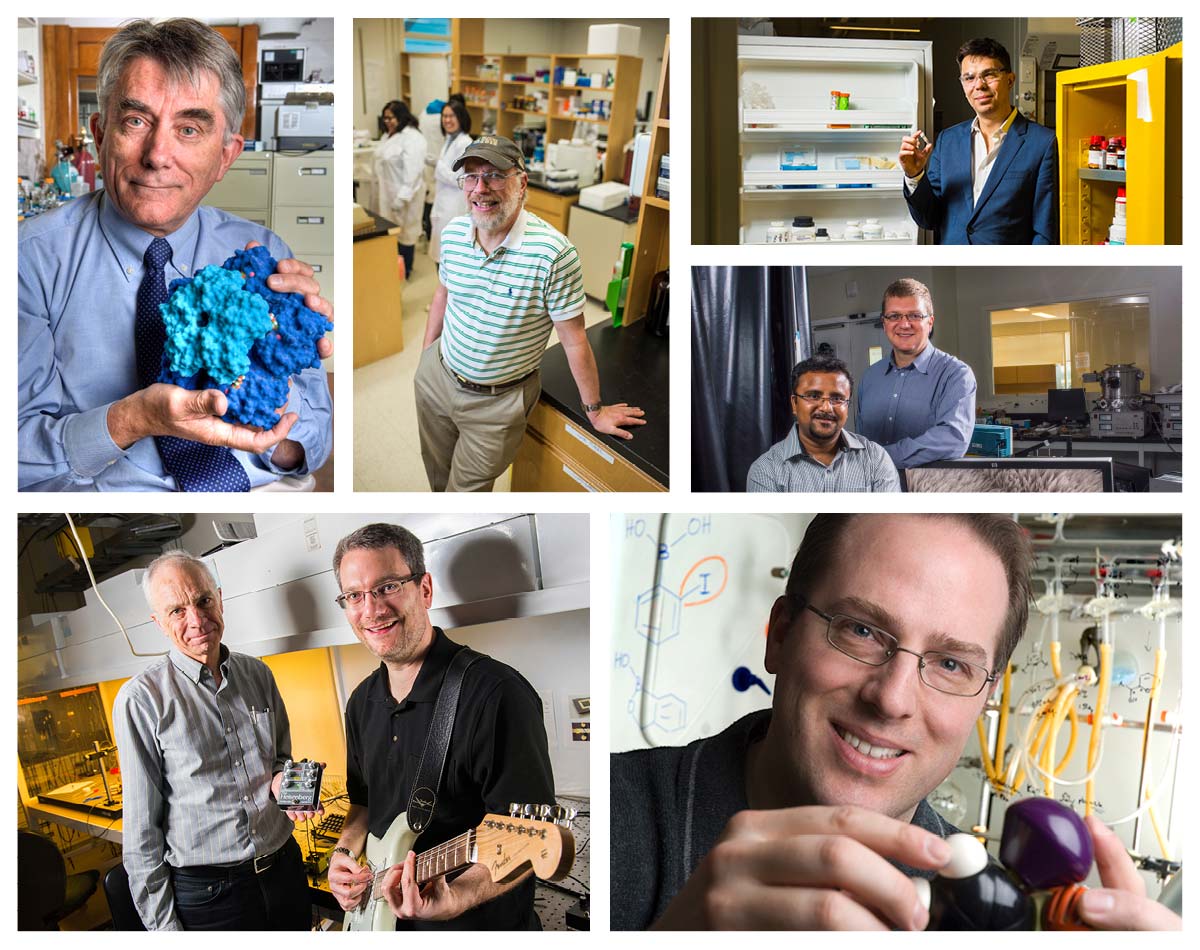
University of Alberta Faculty of Science researchers in multiple disciplines were recognized at the 2018 TEC Edmonton Innovation Awards. Clockwise: David Bundle, David Wishart, Ratmir Derda, Vakthang Putkaradze (R), pictured with Arindam Phani (L), Dennis Hall, and Richard McCreery (L), pictured with Adam Bergen (R).
From combating infectious disease in livestock to democratizing diagnostics in developing nations, Faculty of Science researchers are innovating responses to some of society's most pressing problems. And they're receiving critical acclaim for their creative approach.
TEC Edmonton honoured six Faculty of Science researchers at this year's Innovation Awards. As the University of Alberta's award-winning business incubator, TEC Edmonton supports researchers with emerging companies and technologies as they enter the marketplace. In the Faculty of Science, three researchers received awards for newly patented technologies, and another three were honoured for their work in developing new spinoff companies.
Patent award winners
David Bundle
Professor emeritus in the Department of Chemistry, David Bundle has been a pioneer in the field of carbohydrate chemistry for 50 years. His most recent work targets the detection of the Brucella bacteria, a common and highly infectious disease in livestock. The new technology detects the antibodies created in response to Brucella using small biochemical compounds called oligosaccharides. This invention has the potential to better identify infected livestock and prevent the spread of Brucellosis. Learn more about Bundle's research.
Ratmir Derda
Ratmir Derda, associate professor in the Department of Chemistry, is democratizing the diagnostic lab by bringing simple, easy-to-use technology to developing nations. Derda has designed and patented a portable device used to grow and study cell cultures without sophisticated laboratory equipment, using paper rather than Petri dishes. Derda and his team have also created a method to identify cell types, resulting in a virtual library of collecting and identifying cell cultures in areas with limited resources. Learn more about Derda's work and new spinoff, 48Hour Discovery.
Dennis Hall
In collaboration with Michael Weinfeld from the Faculty of Medicine & Dentistry, Professor Dennis Hall is working to improve cancer treatment. Their newly patented technology prevents the repair of DNA in aggressive cancerous cells, profoundly improving treatment, and for some cancers, potentially eliminating the need for radiation and chemotherapy.
Spinoff company award winners
Richard McCreery
Combining quantum physics and the world of music, a team out of the Faculty of Science and the National Research Council of Canada has created the first commercial application of molecular electronics in the form of electronic junctions in guitar pedals, helping musicians improve their sound quality and harmonics in the process. Led by Department of Chemistry professor Richard McCreery, Nanolog Audio's cutting-edge nanotechnology controls the movement of electrons across carbon molecules, rather than the traditional silicon. The team has unlocked a new spectrum of sound, distinct from other electronic devices. Learn more about McCreery and Nanolog Audio.
Davis Wishart
Renowned scientist David Wishart, professor in the Departments of Biological Sciences and Computing Science, is an expert in metabolomics, the study of metabolism that is one key to predicting and detecting disease. Through his work, Wishart has created DrugBank, a comprehensive, online database containing information on drugs and drug targets that is used by clinicians, the pharmaceutical industry, students, and the public. DrugBank is now licensed to OMx Personal Health Analytics, Inc., a company founded by two former students from Wishart's lab. This work has enabled the discovery and repurposing of a number of existing drugs to treat rare and newly identified illnesses. Hear how donors made Wishart's work possible.
Vakthang Putkaradze
Vakhtang Putkaradze, professor in the Department of Mathematical and Statistical Sciences, is the co-founder of Sensing Insights, a company built around the development of a state-of-the-art sensor that uses nanotechnology. Inspired by the anatomy of insects, Putkaradze worked alongside researchers Arindam Phani and Thomas Thundat in the Department of Chemical and Materials Engineering to develop an innovative mechanical sensor based on interaction of a vibrating nanowire 'brush' with outside air. Both inexpensive and highly sensitive, the sensor has great potential across disciplines and industries. Learn more about the development of Putkaradze's sensors.